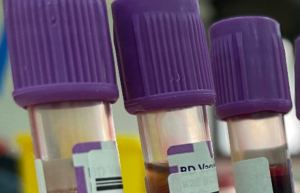Community-Based Organizations Will Work to Increase Vaccine Confidence and Access Among Those Most Affected by Mpox
 ATLANTA—To help prevent a renewed mpox outbreak, the CDC Foundation, in partnership with the Centers for Disease Control and Prevention (CDC), announced $5 million in support to 42 community-based organizations (CBOs) working to increase vaccine confidence, access and acceptance among those most affected by mpox. In 2022, the United States experienced an unprecedented and rapid outbreak of mpox, a rare disease caused by a virus in the same family of viruses as smallpox. While the number of mpox cases in the United States has steadily declined since the peak of more than 400 cases a day in August 2022, a recent study by CDC indicates that many cities in the country are at risk of resurgence or new mpox outbreaks.
ATLANTA—To help prevent a renewed mpox outbreak, the CDC Foundation, in partnership with the Centers for Disease Control and Prevention (CDC), announced $5 million in support to 42 community-based organizations (CBOs) working to increase vaccine confidence, access and acceptance among those most affected by mpox. In 2022, the United States experienced an unprecedented and rapid outbreak of mpox, a rare disease caused by a virus in the same family of viruses as smallpox. While the number of mpox cases in the United States has steadily declined since the peak of more than 400 cases a day in August 2022, a recent study by CDC indicates that many cities in the country are at risk of resurgence or new mpox outbreaks.
Mpox is often spread through close, physical contact, and it can cause flu-like symptoms and a painful rash that can last for weeks. One of the safest and most effective tools to prevent the spread of mpox is vaccination with JYNNEOS, a two-dose vaccine that can prevent infection or reduce the likelihood of severe illness, hospitalization and death. However, CDC estimates that currently only 23 percent of those at highest risk for contracting mpox in the United States have received both doses of the vaccine.
“Without renewed prevention efforts, especially vaccination, we could see a resurgence of mpox, and the next outbreak could be as big or bigger than the one we’ve already experienced,” said Demetre Daskalakis, MD, MPH, acting director for the National Center for Immunization and Respiratory Diseases (NCIRD) at CDC and former deputy coordinator of the White House national mpox response. “Greater immunity means less chance of outbreaks, and the best way to achieve this is to get more people protected with two doses of the mpox vaccine.”
The most recent outbreak has primarily affected gay, bisexual and other men who have sex with men (MSM). Though it is rarely fatal, those with compromised immune systems due to conditions like advanced or untreated HIV infection may experience more severe outcomes. CDC estimates there are 1.7 million people in the United States who would benefit from mpox vaccines, however, factors such as limited healthcare access, fewer providers, lower vaccine confidence and concern about stigma have slowed vaccination efforts. There are also racial and ethnic disparities in vaccine coverage. During the 2022 outbreak, a disproportionate number of cases were among Black and Hispanic or Latino people, yet vaccination rates continue to lag in those communities.
CBOs are essential to increasing vaccination coverage among those at highest risk for mpox, including in LGBTQ+ and Black and Hispanic or Latino persons. These organizations are trusted local resources and understand the historic and ongoing discrimination, inequities and stigma their community members face, especially around healthcare issues. CBOs can communicate information about mpox prevention in clear, accurate and relevant ways, ensuring more people have the resources they need to make informed decisions about vaccination. With support from the CDC Foundation and CDC, CBOs will conduct community education events and outreach to increase mpox vaccination coverage and reduce the risk of resurgence.
“CBOs played a pivotal role in the public health emergency response to the 2022 mpox outbreak by rapidly connecting community members to critical health services and information, and their tireless work helped facilitate the decline in active infections,” said Judy Monroe, MD, president and CEO of the CDC Foundation. “We will continue to support their ongoing efforts to eliminate health inequities and close the gaps in mpox vaccine coverage to give more people an opportunity to protect themselves, their loved ones and their communities.”
Utilizing these resources, CBOs across the country will work to provide accurate and timely information about the safety and effectiveness of the mpox vaccine, as well as increase vaccine confidence, access and uptake in at-risk communities. CBO activities may include developing culturally responsive outreach in multiple languages, training trusted local messengers to support community awareness efforts and partnering with local health departments and organizers of large arts and cultural events and social gatherings to provide access to mpox education and vaccines.
To learn more, see this list of organizations approved for funding through this program.
This project is supported by the Centers for Disease Control and Prevention (CDC) of the U.S. Department of Health and Human Services (HHS) as part of a financial assistance award totaling $5,000,000 with 100 percent funded by CDC/HHS. The contents are those of the author(s) and do not necessarily represent the official views of, nor an endorsement by, CDC/HHS or the U.S. Government.
